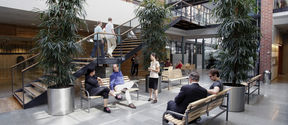Schools, departments and units
Scientific research, artistic activities and teaching are carried out at Aalto's six schools and their departments and units.
Scientific research, artistic activities and teaching are carried out at Aalto University's six schools and their departments and units. Schools are responsible for research and education within their own fields based on university's strategy, school's annually updated strategic plans (Our Plan), budget and university's joint rules and principles. In addition, the university has joint academic activities that transcend university boundaries. In addition to the university's shared services, service functions are also implemented in schools.

The schools consist of departments and separate units. In addition, the university and the schools may have joint units with other universities and universities of applied sciences, as well as research institutes and corporate bodies. More information on schools, departments and other units is available on their webpages.
Research, artistic activities and teaching are carried out in six Aalto University schools and their departments and units, as well as in Aalto University's joint academic activities (JAAs).
University's organisation and governance is further described in section 'Management' in this handbook.

Scientific research, artistic activities and teaching are carried out at Aalto's six schools and their departments and units.

These joint units cover a range of multidisciplinary areas that support Aalto University's advancement in academic and research activities and impact creation.
The relations between the university's executive bodies, the board, the academic affairs committee (AAC) and the president, and the appointment of these bodies are regulated in the Universities Act, in the Foundations Act and the University's Constitution and Bylaws which are based on these regulations. The premise is the division of powers between the executive bodies: on the one hand, they have an explicit division of responsibilities and independent authority that the other body cannot exercise, and on the other hand, mutual responsibility for the cooperation and monitoring of the activities of the other executive bodies. In accordance with the principle of university democracy, the university community elects among its members a tripartite committee that decides on academic affairs such as admission criteria, curricula and degree requirements.

The university community elects representatives to the university's 'joint multi-member administrative body', i.e. the Academic Affairs Committee (AAC).
AAC appoints the board members and decides on the length of the term of the term of the board and its members. The Board Nomination Committee appointed by AAC makes a proposal to AAC on the appointment of board members.
The board elects the president and provost and defines the number of vice-rectors in the bylaws.
The president appoints the chairman and secretary of the academic affairs committee.
Aalto University is a foundation university, and its decision-making and administration are organised in accordance with the Universities Act and the Foundations Act. Academic affairs and the management of the university's and schools' activities, as well as the preparation of joint matters, are organised by ensuring the utilisation of the expertise of the university community and joint discussion and participation.
In accordance with the Universities Act and Foundations Act, management and decision-making are the responsibilities of three decision making bodies: the Board, the President and the Academic Affairs Committee. Universities may determine the detailed organisation of decision-making and the preparation of decisions independently, within their autonomy.
The bylaws of Aalto University and Schools (Aalto University Foundation’s Constitution, the Bylaws of the University and Schools) and the President's decisions
Different management and steering groups coordinate the daily activities of the university and prepare proposals for the president and the board. In practice, all decisions affecting joint activities are made in cooperation with all units.
The executive bodies of the university are the Board (AUFB), the President, and the University Academic Affairs Committee (AAC). Their roles and responsibilities are described in the Aalto University Constitution and Bylaws. The management teams and steering groups coordinate the daily work at the university and the preparation of pre-decision motions.
The Aalto University Foundation Board (AUFB) decides on the strategy, operation and financial issues and is responsible for any far-reaching plans.
The committee is a joint, university-level administrative body serving to promote a high quality of research, teaching, and artistic activity.
The president directs the university and represents the science and art community constituted by it. At Aalto University, the president also acts as the managing director referred to in the Foundations Act.
Provost acts as deputy president, supports the president in strategic development, appointment of professors and resource management as well as leads the processes connected to teaching, research and societal impact.
The Professors' Council acts as an advisory body for the president and vice presidents and ensures that the voice of the academic science and art community is heard in essential issues related to the values of the university.
The Aalto University Tenure Track Committee gives recommendations to the president on tenure and full professor advancement decisions and on the direct recruitment of tenured professors.
The management teams and steering groups coordinate the daily work at the university and the preparation of pre-decision motions.
The President's Management Team (PMT) coordinates the daily work at the university and the preparation of pre-decision motions. The Aalto Management Team (AMT) furthers transparency and open dialogue in decision-making regarding university development.
The steering groups discuss strategic and operational issues that require a university-wide position, policy line or recommendation for the university’s leadership and decision-making. Aalto University has four steering groups: Research Steering Group (RESG), Learning Steering Group (LESG), Impact Steering Group (ISG), and Enablers Steering Group (ESG).
Open discussion as well as everyone’s opportunity to participate and follow the preparation of decision-making on implementation of strategy and the common matters are key values of the Aalto University’s operating culture and the organisation of decision-making.
Participation and consultation take place through community events, and also in various expert forums and statutory bodies with representatives from different areas of expertise, schools, personnel groups and students. Members of preparatory bodies may be contacted to convey development ideas and feedback to decision-making.
The Aalto community has participated, for example, in the preparation of the university's strategy and common principles, such as Code of Conduct, and other matters relevant for whole community such as campus vision, hybrid-ways of working and developing space utilisation.
Especially when discussing matters with societal impact, representatives of alumni and stakeholders are also often invited to participate.

Other bodies that play an integral role in the administration of academic affairs at Aalto University include the Doctoral Education Working Group (DEWG), Research Ethics Committee, and Academic Appeals Board. The tasks of these bodies are vital for the healthy functioning and development of academic activities and processes at the University.

Get to know other important actors at Aalto University and their organisation and responsibilities.
Aalto University Foundation and its subsidiary companies and enterprises constitute the Aalto University Group.

Aalto University Group owns several business enterprises. Aalto University Properties Ltd is the largest of these.